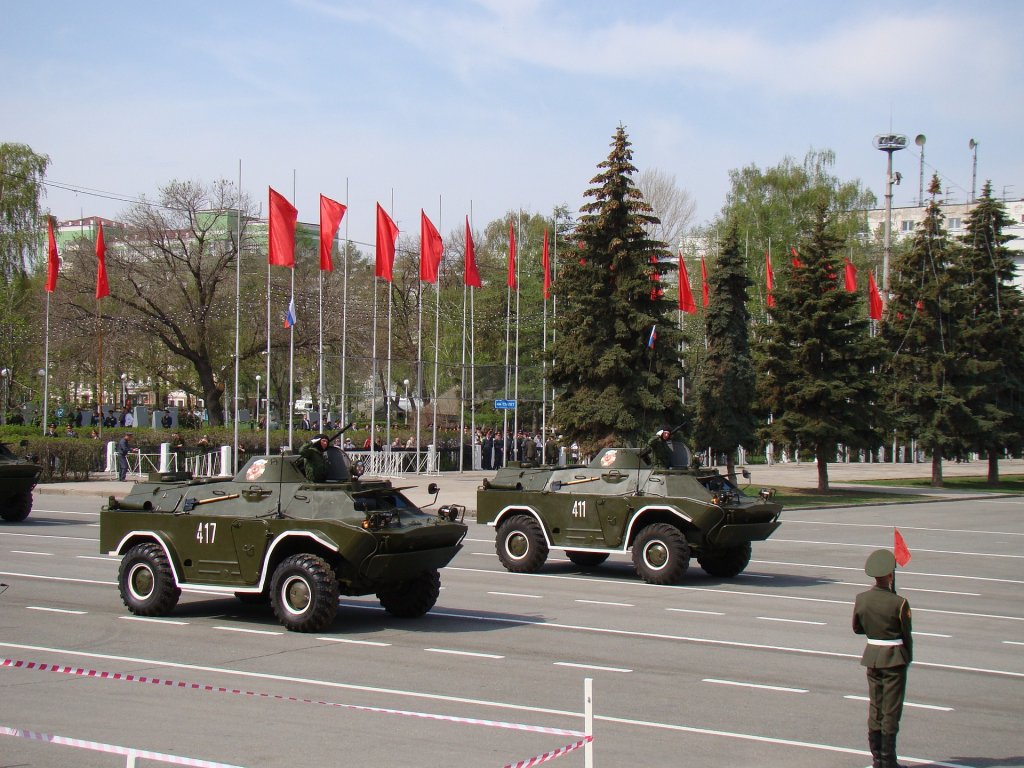Central Asian Leaders Opted to Attend Curtailed Parade in Moscow- Pavel K. Baev

The Victory Day celebrated on May 9 is a hugely
important and emotionally loaded holiday for the majority of Russians and
Ukrainians, Kazakhs and Uzbeks, whose grandfathers fought together and defeated
Nazi Germany back in 1945. In Russia, this solemn Remembrance Day was gradually
converted by all-pervasive propaganda into a manifestation of militarism and aggressive
ambition. This year, however, the traditionally loud festivities were subdued and
street parades were cancelled due to security concerns. Russia’s fourteen and a half months long war against
Ukraine is not going well at all, and the very reduced military parade on the Red Square in Moscow revealed the sad
degradation of the formerly proud army. Yet, the presidents of all five Central
Asian states, as well as the President of Belarus and Prime Minister of
Armenia, were there to make company for Russia’s beleaguered President Vladimir
Putin.
The circumstances of this collective action are rather
murky as four days prior to the big day, only Kyrgyzstan’s President Sadyr
Japarov announced his schedule to travel to Moscow. Then Tajikistan’s President Emomali
Rahmon confirmed his visit, but it was only on May 8 that Kazakhstan’s reform-committed
President Kassym-Jomart Tokayev, Uzbekistan’s domestically-preoccupied
President Shavkat Mirziyoyev, and Turkmenistan’s reclusive President Serdar Berdimuhamedov
boarded their planes without even a word on the sudden change in their respective plans. Only direct and urgent
phone calls from the Kremlin could have convinced them to make the politically difficult
decision, but there are no signs of such summons on the official websites or
other track records.
What made the normally carefully scripted ceremonies
in Moscow unusually tense was the shocking drone attack on the Kremlin in the early hours of May 3, with two
spectacular even if low-yield explosions over the cupola of the Senate palace,
on which the main flagpole is proudly erected. No material damage was done, but
the political resonance of this daring strike, which the Ukrainians deny any
involvement in, was massive. Suspicions in a “false flag” operation staged by a branch of Russian omnipotent security
services remain thick, but it has become clear that the attempts by the top
brass to deliver a due “retaliation” failed, as the hypersonic Kinzhal Kh-47M2 air-launched missile was shot down over Kyiv by the
US-supplied Patriot MIM-104 air-to-surface system. Putin was compelled to show
determination in presiding over the parade, and the presence of Central Asian
guests of honor became an insurance against the risk of another drone strike, which would have amounted to
a major international incident.
Putin’s need in surrounding himself with high-level
guests was quite obvious, but the motivations of six leaders (with the obvious
exception of Alexander Lukashenko, who is in no position to refuse Putin’s summons) are less clear. All five
Central Asian states are playing, with different skill and success, a balancing
game regarding the Ukraine war, refusing both to condemn Russian aggression and
to recognize the annexations. This game is not that dissimilar to the policy that Türkiye is pursuing, though none of them dares to supply
weapons to Ukraine. There is, however, always a price to pay for playing it
both ways, and Tokayev, for one, was hardly entertained listening to Putin’s speech on the “civilization” coming again under attack from
the treacherous Western elites.
This minor humiliation of displaying loyalty to
Russia’s ruler is made agreeable by the fact that Kazakhstan is one of the main beneficiaries of the evolving confrontation between Russia and the
West. Tens of thousands of young Russians have escaped from mobilization to
this country, and hundreds of businesses have relocated to Astana and Almaty. Kazakhstan’s export to Russia
has increased manyfold, and media investigations show that a large part of this trade flow consists of
goods from Europe travelling this long way to satisfy desperate Russian demand
for industrial imports. The EU takes measures to plug holes in the sanctions
regime and seeks to ensure Kazakhstan’s cooperation in preventing the supply of spare parts and high-tech
components that the Russian defense-industrial complex urgently needs, but the definition of “dual use”
technologies has become impossibly broad and complex.
What both the autocratic and the semi-democratic
leaders of the post-Soviet states worry about are the consequences of Russia’s
fast-progressing weakening in the course of the unwinnable war. Moscow may be
unable to perform the role of a “security guarantor”, which it demonstrated as
recently as January 2022, deploying troops to Kazakhstan for a short order-restoring mission. The durability of Putin’s regime remains,
nevertheless, a crucial underpinning for stability in Central Asia, so the five
leaders reasoned that a little demonstration of solidarity can do no harm. They
are all aware that the unimpressive parade in Moscow took place in the shadow
of the long-prepared Ukrainian offensive, which may break the deadlock in the devastating
war. Whether Putin’s regime survives the impact of a very probable defeat is
the question that looms large for all neighbors, as well as for the re-energized
West committed to delivering victory to Ukraine, but the answer can only be
delivered by the Russians, who cannot find a clue in the old victory for bringing
to an end the tragic unjust war that has demoralized the society and shaken the
Russian state.

Pavel K. Baev, Dr., Peace Research Institute, Oslo (PRIO)
Dr. Pavel K. Baev is a Research Professor at the Peace Research Institute, Oslo (PRIO). He is also Senior Non-Resident Fellow at the Center for the U.S. and Europe at the Brookings Institution (Washington D.C.), Senior Associate Researcher at the Institut Français des Relations Internationales(IFRI, Paris), and Senior Associate Research Fellow at the Italian Institute for International Political Studies (ISPI, Milan). His research interests include the transformation of the Russian military, the energy and security dimensions of the Russian-European relations, Russia’s Arctic policy, Russia-China partnership, post-Soviet conflict management in the Caucasus and the Caspian Basin, and Russia’s Middle East policy, which is supported by the Norwegian Foreign Ministry. He writes a weekly column in Eurasia Daily Monitor.
To cite this work: Pavel K. Baev, “Central Asian Leaders Opted to Attend Curtailed Parade in Moscow”, Panorama, Online, 18 May 2023, https://www.uikpanorama.com/blog/2023/05/18/pb-5/
Copyright@UIKPanorama. All on-line and print rights reserved. Opinions expressed in works published by the Panorama belongs to the authors alone unless otherwise stated, and do not imply endorsement by the IRCT, Global Academy, or the Editors/Editorial Board of Panorama.